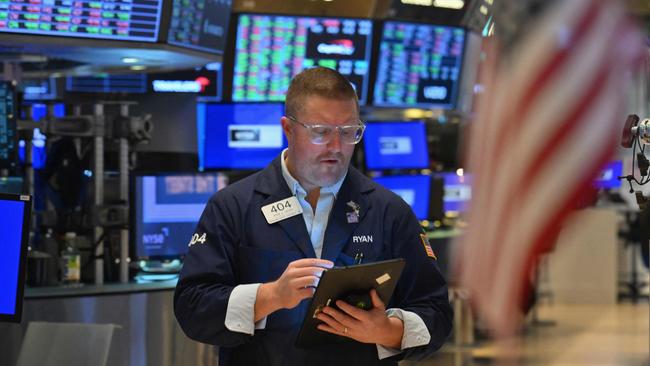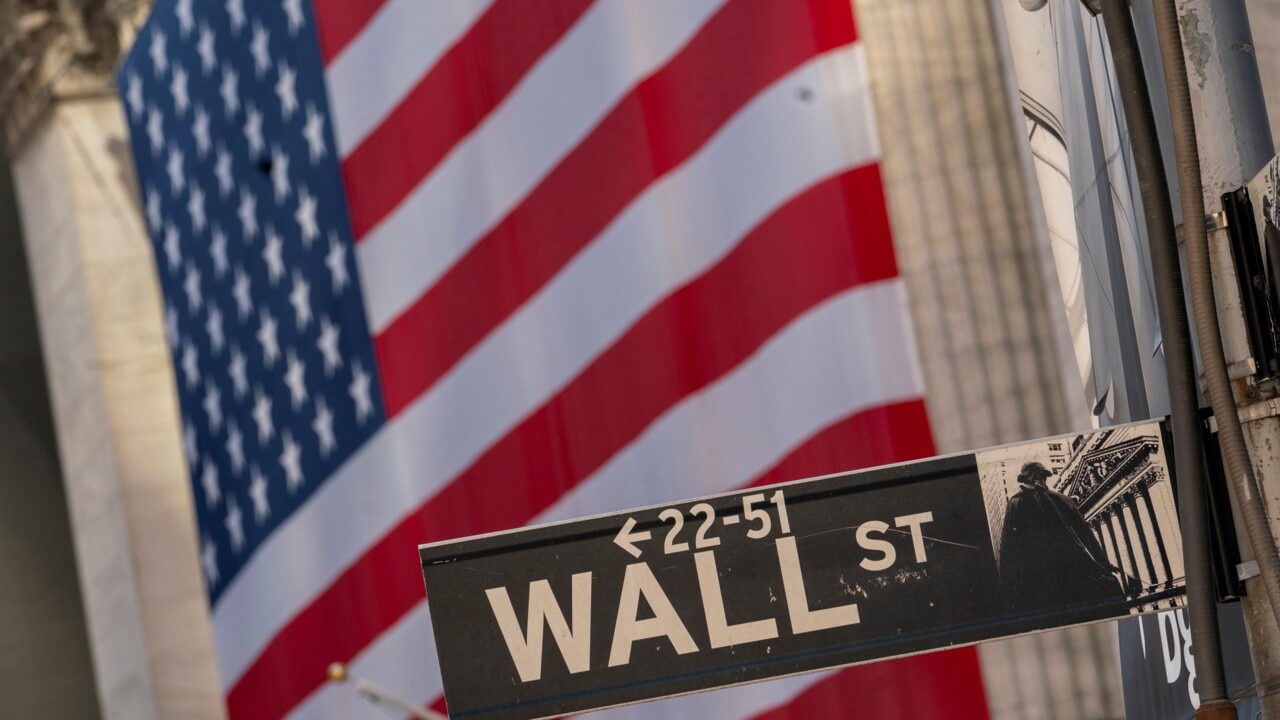ASX 200 dives 3.7pc in $102bn sell off as US recession fears spark widespread losses
Australian investors suffered the worst trading day on the ASX since May 2020 as fears of a recession in the US sent share prices, oil and the dollar sharply lower.

Business
Don't miss out on the headlines from Business. Followed categories will be added to My News.
Australian investors have wiped more than $100bn off the local sharemarket on Monday in the bourse’s worst session since the start of the Covid-19 pandemic on fears that the US economy could be drifting towards recession.
The S&P/ASX 200 lost 293.60 points or dived 3.7 per cent to a six-week low of 7649.6, wiping $102bn off the value of the index. It was the biggest one-day drop since May 1, 2020, when shares fell 5 per cent.
Falls in the past two sessions have now totalled 5.8 per cent and the broader All Ordinaries plunged 3.8 per cent on Monday to 7859.4.
Investors globally have been spooked after US data including worse-than-expected job numbers on Thursday, sparked concern that the world’s largest economy is not as strong as previously thought. The US added 114,000 jobs last month, a drop from the prior month and less than expected, while the unemployment rate rose to the highest level since October 2021.
The data coupled with disappointing results from tech firms Alphabet, Intel and Amazon, the latter fell 8.8 per cent on Friday, led to share sell-offs at the end of last week, which have continued in trade across the Asia Pacific on Monday.
Tokyo saw sharper losses as the benchmark Nikkei 225 plunged 12.4 per cent in its biggest single-day falls since 1987 amid recession fears and a resurgent yen after the Bank of Japan lifted rates for the second time in 17 years last week.
Mayham saw the Australian dollar retreat 1.6 per cent to a three-month low of US64c at the close as investors fled the risk currency to safe haven assets such as US Treasury bonds and the US dollar.
WAM Global portfolio manager Nick Healy said losses came amid a shift in messaging from companies that had expected a soft landing to now warning of weaker conditions for consumers.

“The US economy and the US market are just such big, important parts of the global economy and the global markets that they absolutely will have knock on effects in countries such as Australia,” he said.
“That being said, interest rates are up in Europe, also in the UK and Australia, and to some degree face similar underlying structures, and potential risk too.”
Tech led all 11 sectors that make up the ASX 200 lower as it dived 6.6 per cent following an 8.8 per cent fall in WiseTech Global. The sector is vulnerable in periods where the economy could contract instead of expanding. Energy stocks posted outsized losses on fears that a recession will weaken demand for oil, while the country’s largest bank, Commonwealth Bank, dived 5.7 per cent to $124.89.
Domino’s Pizza Enterprises and ResMed were the only companies on the ASX 200 that rose, as the latter benefited from a strong fourth quarter and as it told investors that demand for sleep apnoea devices will continue to grow this year.
RBC Capital Markets Head of US Equity Strategy Lori Calvasina said while the economic data was the catalyst for the move lower, markets had been vulnerable to a pullback for some time.
“What’s worried us include stretched sentiment and positioning, the stock market’s poor seasonal track record in August through October in recent years, and the presidential election where pullbacks tend to happen in both the spring and fall,” she said.
“Generally speaking, those problems haven’t resolved and keep the stock market vulnerable to additional declines.”

The rout was expected to continue overnight in the US. Futures tied to Wall Street suggested that the S&P 500 would fall 2.6 per cent at the open tonight, while the tech-heavy Nasdaq could dive 5 per cent and the Dow Jones Industrial Average headed to a 1 per cent decline.
Markets also waited for US ISM Services PMI data overnight, which was expected to be 51.
Above 50 was an indication the economy is expanding.
IG market analyst Tony Sycamore said weakness in PMI data would confirm market jitters and likely force the Federal Reserve to cut rates by 50 basis points in September.
“If the ISM services PMI dips further that becomes a concern because manufacturing, the labour market, the services sector, all telling the same story that the Fed has left it too long to start cutting rates,” he said.
Mr Sycamore said the ASX 200 had a better chance than other indices to withstand the turmoil due to its not having had strong gains like Wall Street, adding that investors should neither look to sell or buy at this stage.
“This is a correction in many markets which were frothy, but the jury is still out if it turns into something more sinister,” he said.

Local investors are awaiting the Reserve Bank’s interest rate decision on Tuesday afternoon. Governor Michele Bullock is expected to hold the cash rate at 4.35 per cent after its preferred measure of inflation fell to 3.9 per cent in the June quarter.
Betashares chief economist David Bassanese said while there no signs to suggest that the US would enter into a recession, such concern would ensure the RBA would not lift rates this month.
“As former RBA Governor Ian Macfarlane once observed, recessions usually arise from imbalances or shocks – and the US is not really suffering from either at present,” he said.
“Rather, what we may be seeing is an easing back or ‘re-normalising’ in conditions after the post-Covid pressure cooker environment of extreme labour shortages and stimulus-driven demand.”
The benchmark Brent crude price was down 0.8 per cent to a two-month low of $US76.05, while Singapore iron ore futures lifted 0.8 per cent to $US104.64 per tonne.
Originally published as ASX 200 dives 3.7pc in $102bn sell off as US recession fears spark widespread losses





